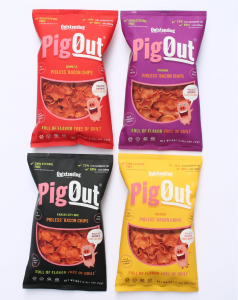Plant-Based Snacks Capture Consumers’ Interest
by
By Robin Mather
If Mintel’s David Lockwood is right, you’re going to see more plant-based snacks in the marketplace this year. And next year, and the year after that.
“One third of snack purchases are plant-based,” Lockwood told the audience at a session called “The State of the Specialty Food Industry” at the Summer Fancy Food Show in New York, New York, in July. That share is only likely to grow, as consumers across all demographic sectors turn to plant-based snacks.
You can credit the adventurous palates of Millennials and members of Gen Z – the newest demographic, those of ages 11 to 23, that Mintel is tracking — for part of that explosion in interest.
“The younger people are, the more they gravitate to plant-based foods,” says Bill Glaser, Chief Executive Officer and co-Founder of Outstanding Foods, which launched its PigOut Pigless Bacon Chips in October. “Gen Z and Millennials are more apt to experiment — and they love salty, crunchy types of snacks. If you can add health benefits, all the better. To reach that market, having such an innovative product can get them to try other plant-based products.”
PigOut chips are made from mushrooms, Glaser says. “These whole-ingredient mushrooms are loaded with antioxidants, they’re anti-bacterial and anti-microbial, and there’s lovastatin, which lowers cholesterol, in the mushrooms.” The health properties are not depleted in cooking, he says.
 PigOut chips come in a full-sized bag, comparable to a bag of potato chips, with 3.5 ounces of chips in the bag and a suggested retail price of $4.99. A one-ounce serving has 160 calories. Glaser says PigOut chips will be stocked with potato chips and corn chips. “We did not want to be shelved with kale chips or coconut chips,” he says.
PigOut chips come in a full-sized bag, comparable to a bag of potato chips, with 3.5 ounces of chips in the bag and a suggested retail price of $4.99. A one-ounce serving has 160 calories. Glaser says PigOut chips will be stocked with potato chips and corn chips. “We did not want to be shelved with kale chips or coconut chips,” he says.
Packaged Facts says vegetable snacks like PigOut chips are the most popular of the alternative-ingredient snacks, with 45 percent of the dollar sales in that category. The category includes vegetable chips such as Terra Chips and dried vegetable crisps such as Harvest Snaps. But pulse snacks, such as the chickpea-based The Good Bean, Hippeas and Biena Snacks, have seen sales growth of more than 150 percent in the year ending in October 2016, Packaged Facts says.
Plant-Based for Health – and the Environment
“The vegan trend is growing, and more and more Millennials don’t want to eat animal products,” says Helena Lumme, Co-Founder of Hälsa, a line of oat-based drinkable yogurts manufactured in New York from imported organic Swedish oats. Hälsa boasts that it’s made from simple, clean ingredients. “It’s a lifestyle choice as well. The population, as it’s getting more diverse, there are more people who are lactose-intolerant. That’s also something that increases with age – we are less and less tolerant of milk sugars as we age. So, many people want to reduce the amount of dairy products they eat, but a lot of the non-dairy yogurts include gelling agents or carrageenan. Ours does not.” whole-grain oats, it’s fortified with probiotic and gut health bacteria, and has a suggested retail price of $2.99 for an eight-ounce bottle.
Lumme and her company are betting that consumer interest in non-dairy yogurts will continue to grow.
Hälsa is available in four flavors – Mango Pear, Apple Cinnamon, Strawberry and Blueberry. Made with The company now has a plain flavor yogurt in development to use as a base for smoothies, and should have it ready to release later this year or in the first quarter of 2019.
Products such as non-dairy yogurt have wide appeal across all ages. HealthFocus International, a marketing and research agency based in St. Petersburg, Florida, reports that 60 percent of consumers ages 15 to 70 say they’re cutting back on meat products, and 55 percent say that change is permanent. Another 22 percent say they hope the change is permanent.
HealthFocus’s Steven Walton says that, as manufacturers improve taste, convenience, availability and price, the segment will continue to grow.
“The entry points are multiple … and core to consumer beliefs, motivations, lifestyles and interests,” he says. “Opportunity for growth and new products [in plant-based foods] is strong, and we are in for an exciting time.”
While healthy snacks may have once meant dutifully chowing down on something flavorless and boring, that’s no longer the case, says Robbie Rech, co-Founder and Chief Executive Officer of Hope Foods, which makes hummuses. Today’s snacks are not only full of flavor, he says, they’re also full of all the things that consumers seek for healthy eating.
Flavor is key if snack makers want to succeed in a competitive market, however.
Nikki Azzara, Founder of P.S. Snacks, a line of bean-based edible cookie dough treats manufactured in Brooklyn, New York, says her company’s mission is to create something familiar, by using plant-based, nutrient-dense ingredients to make a healthier alternative.
“Taste has to be a factor,” she says. “All this innovation shows that you can enjoy something that is plant-based, and you won’t even really know the difference.”
P.S. Snacks has six SKUs – three flavors in either 12-ounce cartons or three-ounce individual portions “comparable to applesauce or yogurt,” she says. The snacks have a suggested retail price of $7.99 for the 12-ounce cartons, and $2.69 for the three-ounce portion packs, sold in the grab-and-go cold deli counter.
“People are seeing how shifting their diets to consuming more nutrient-dense products is better for their health,” Azzara says. “They’re also seeing that it’s better for the environment.”
Glaser agrees with Azzara. “People are trying to add more plant-based foods to their diet — for their own health, for the welfare of animals, and for the environment,” he says. “The tastiest foods are found in the snack aisle, and snack foods offer the convenience of trying something without a big commitment. Plant-based snacks open the door; they offer a gateway to trying other plant-based products.”




